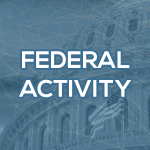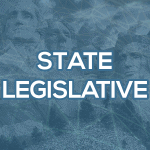We enjoyed great conversations and the beautiful location at our 2025 Executive Summit in Woodstock, VT. This year’s Summit featured 12 education sessions and 16 networking events, including golf at the Woodstock Country Club, a special Wednesday Evening Networking Social, and casual networking around the firepit Tuesday and Wednesday nights. Thank you to all our sponsors and attendees!








President Trump issued an Executive Order on August 7 aimed at guaranteeing fair banking access for all Americans. Citing personal experiences of being denied banking for political views, the order instructs federal regulators to remove “reputational risk” as a factor in banking guidance, review past practices for politically motivated exclusions, and require agencies such as the SBA to reinstate affected customers. Rep. Andy Barr (R-Ky.), chairman of the House Financial Institutions Subcommittee, announced plans to introduce legislation making the order permanent.
The White House also released the White House AI Action Plan, intended to strengthen U.S. global leadership in artificial intelligence. Centered on three principles – accelerating AI innovation, building AI infrastructure, and leading in international AI diplomacy – the plan emphasizes deregulation by removing federal rules that unnecessarily limit AI development and deployment. Federal agencies are expected to continue rolling back regulations that hinder technological development and deployment.
The FCC is also looking at AI initiatives. Commissioner Brendan Carr stated that the FCC may consider overriding certain state-level AI regulations. He indicated it is possible the FCC could use its existing authority under 47 U.S.C. § 253 and 47 U.S.C. § 332 to preempt such state laws or barriers.
Several bipartisan bills have been introduced in Congress. H.R. 4801, the Unleashing AI Innovation in Financial Services Act, introduced by Rep. French Hill (R-Ark.) and co-sponsored by members of both parties, would create “AI Innovation Labs” within major financial regulatory agencies. These labs would allow supervised experimentation with AI-driven financial products and services, giving regulated entities greater flexibility with reduced regulatory burdens. S. 2367, the AI Accountability and Personal Data Protection Act, introduced by Sen. Josh Hawley (R-Mo.) and also co-sponsored by members of both parties, would establish a federal tort allowing individuals to sue if their personal data is used to train AI models without express prior consent.
Bipartisan legislation also extends beyond AI with two Senate bills addressing call center operations. S. 2666, the Foreign Robocall Elimination Act, directs the FCC to create a task force, coordinated with the FTC and Attorney General, to combat illegal automated calls. The task force would include federal agency representatives and seven private-sector experts. S. 2495, the Keep Call Centers in America Act of 2025, requires the Secretary of Labor to maintain a public list of employers that move or subcontract call center work overseas. Listed companies would be ineligible for federal grants or guaranteed loans, and businesses would be required to disclose the physical location of customer service agents. The bill also mandates that federally contracted call center work be performed within the United States.
The House Financial Services Committee has requested feedback on federal consumer financial data privacy laws and potential legislative updates to reflect changes in the financial services sector. Questions focus on whether and how to modernize the Gramm-Leach-Bliley Act (GLBA) and related privacy rules. RMAI will submit a response by the August 28, 2025 deadline.
The CFPB has issued notices of advanced rulemaking on potential changes to the definition of “larger participants” in four markets: automobile financing, consumer debt collection, consumer reporting, and international money transfers. Raising the threshold could reduce supervisory oversight by excluding all but the largest companies. RMAI is reviewing the notices, with comments due September 22, 2025.
RMAI monitors, tracks, and responds to legislative and regulatory activity in all 50 states as the need arises. Backed by RMAI’s State Legislative Committee and a team of state lobbyists, RMAI educates legislators and regulators about the industry and the negative impacts or unintended consequences a bill would have on businesses and consumers. If you have an interest in volunteering in RMAI’s grassroots advocacy efforts, please contact RMAI General Counsel & Senior Director of Government Affairs David Reid at (916) 779-2492 or [email protected].
Record Number of State Lobbyists Retained in 2025
In 2025, RMAI has had to retain 12 state lobbying firms to assist our state advocacy efforts. This breaks our prior record of 10 lobbying firms which was set in 2014. The states/territories where RMAI retained lobbyists were California, Colorado, Delaware, Maine, Michigan, Nevada, New Mexico, New York, Oregon, Puerto Rico, Vermont, and Wyoming. In many respects, this is a glass half full record. While it is unfortunate the financial services industry is facing such a high volume of negative state legislative proposals, RMAI is nonetheless fortunate that we have the resources to defend the industry due to the generosity of the association’s membership to the RMAI Legislative Fund.
Top Issue – Medical Debt
Medical debt legislation remains the most active subject matter that RMAI is lobbying on in 2025. Currently, we are tracking 147 medical debt bills in 39 states and are actively lobbying bills with a strong likelihood of passage in over a dozen states. RMAI’s singular concern on these bills is the definition of “medical debt.” We are advocating for a narrow definition that ensures the definition does not include various consumer credit products, including credit cards, bank loans, and home equity lines of credit.
Several important non-medical debt bills RMAI is engaged on include:
Massachusetts SB 2559 – This bill would, among other things: (1) increase the garnishment exemption from 50x state minimum wage to 65x state minimum wage; (2) reduce the statute of limitations (SOL) in an action for the collection of a consumer debt from six to five years; (3) prohibit the revival of a debt that is beyond the statute of limitations through the making of a payment; and (4) reduce the time allowed to take action to enforce a judgment from 20 to 10 years but allows renewing the judgment for an additional 10 years. If passed, the bill would take effect on January 1, 2026. [RMAI had been opposing this bill since 2014 when it was first introduced. After eight years of negotiations and countless amendments, RMAI, other industry participants, and consumer advocates agreed to amendments that resulted in a neutral position by the industry. Among items removed from the bill through RMAI’s efforts from its 2014 introduction: (a) 90x minimum wage garnishment exemption; (b) expungement of the debt once the SOL expires; (c) reducing the SOL from six to three years; (d) preventing the tolling of the SOL through a payment prior to the expiration of SOL; (e) reducing the enforcement of a judgment from 20 to 5 years with no renewal; (f) applying the bill’s provisions to real property; and (g) once the consumer exceeds the exemption threshold, only being able to garnish on income above the threshold.]
New York AB 8427-A/SB 8416 (NY Attorney General Program Bill) – This bill would enact the “Fostering Affordability and Integrity through Reasonable (FAIR) Business Practices Act” to expand the attorney general’s ability to protect New Yorkers from unfair, deceptive and abusive business practices. [RMAI was in strong opposition due to the bill containing: (1) an enhanced private right of action where the consumer does not have to show an actual injury and (2) a public registry of all UDAAP settlements. RMAI has had three very constructive meetings with the New York Attorney General’s Office in the past month explaining our opposition. Through RMAI’s efforts and that of the New York Business Council, of which RMAI is a member, the bill was amended to resolve the concerns raised by RMAI. Removed from the version which passed the Senate was language that: (i) allowed a third party to bring a private right of action on behalf of others without their consent, (ii) allowed the plaintiff to bring suit without actual injury, (iii) created a public registry, and (iv) created higher penalties for a private right of action. With these changes, the bill is generally in line with existing UDAAP laws from other states. This bill has passed both houses of the legislature and is awaiting to be sent to the Governor.]
Pennsylvania HB 1731 – This bill would adopt the Consumer Debt Collection Fairness Act which would: (1) require any legal action to collect consumer debt to include detailed documentation, including the name of the original creditor, the last four digits of the account number, an itemized statement of the amount owed, proof of ownership of the debt, and a copy of the original contract or charge-off statement; (2) reduce the statute of limitations from 4 to 3 years on consumer debt; (3) prohibit courts from entering default judgments against consumers unless the plaintiff provides an affidavit of facts based on personal knowledge, all required documentation, and proof of proper service and notification of consumer rights; and (4) require a consumer notice informing consumers of their rights to dispute the debt, request documentation, and seek legal assistance. [RMAI is opposed to and closely monitoring this legislation. As of now, we believe this bill only has a 50/50 chance of passing the House but a very low chance of Senate passage. Should intel suggest otherwise, RMAI is prepared to step in with active opposition.]
Puerto Rico PS 255 [Hyperlink is not provided as the text is in Spanish] – This bill would adopt an overly broad definition of “medical debt” which would apply to any medical debt charged to a general-purpose credit card. [RMAI opposes any medical debt bill that imposes medical debt restrictions on financial service products. We insist the definition apply only to debt owed to a medical provider. The Puerto Rican Legislature operates in Spanish, including the website and bill text, which adds a certain challenge in lobbying efforts. However, RMAI has retained a strong and highly respected bilingual lobbying firm to assist the association in obtaining amendments.]
Fourth Circuit Holds Initiation of Collection Lawsuit Barred Arbitration
Roper v. Oliphant Fin., LLC, No. 24-1933, 2025 U.S. App. LEXIS 18266 (4th Cir. July 23, 2025)
A debt buyer retained a law firm to bring a collection action against a consumer in state court, but the action was dismissed due to the debt being beyond the statute of limitations. The consumer then filed a lawsuit in federal court against the debt buyer and law firm alleging violations the federal Fair Debt Collection Practices Act and the Maryland Consumer Debt Collection Act.
The trial court denied the motion of the debt buyer and law firm to compel arbitration, holding they “had waived their right to compel arbitration by filing the collection action.”
On appeal, the U.S. Court of Appeals for the Fourth Circuit explained that “[t]o determine whether a party has waived the right to compel arbitration, a court must determine whether the party seeking to compel (1) knew the right to compel existed, and (2) acted inconsistently with the intention of enforcing the right to compel arbitration.” Additionally, “[u]nder Maryland law, a party acts inconsistently with the intent to compel arbitration when it litigates a case concerning the same claims as those it wishes to arbitrate.”
Here, the appellants argued that the trial court erred in its ruling because the consumer’s claims related to the debt buyer’s actions prior to the collection lawsuit. The Court conceded that “claims based on actions that predate a collection suit—claims that would exist regardless of whether that suit was filed—might not be sufficiently related to the claims in a collection suit to be exempted from an arbitration agreement based on waiver.” However, the Court distinguished the facts in this case.
The Court noted that the consumer complained the debt buyer sent collection letters to consumers but then waited more than three years beyond the statute of limitations to file suit. The Court concluded, in its unpublished opinion, that “[t]he illegal actions complained of, therefore, do not constitute actions taken prior to the suit, but the filing of the suit beyond the statute of limitations.”
Therefore, the Court of Appeals affirmed the order of the trial court.
Eleventh Circuit Finds Corporate Declaration Sufficient to Enforce “Clickwrap” Arbitration Agreement
Newton v. Experian Info. Sols., Inc., No. 24-12398, 2025 U.S. App. LEXIS 18737 (11th Cir. July 28, 2025)
A consumer was notified of a data breach involving her personal information and signed up for one year of free credit monitoring with a consumer reporting agency (“CRA”) as well as initiating a credit freeze. Five years later she discovered information that did not belong to her in her credit file and brought an action against the CRA alleging violations of the Fair Credit Reporting Act, 15 U.S.C. §§ 1681-1681x.
The CRA moved to compel arbitration and submitted a declaration from its Director of Product Operations describing the process for signing up for credit monitoring. The trial court denied the motion, deeming the “declaration as insufficient to show that [the consumer] actually acceded to the [arbitration] agreement because it did not state what [the consumer] in particular saw when she signed up but instead only spoke to what a consumer would see when signing up.” The CRA appealed.
The U.S. Court of Appeals for the Eleventh Circuit, in an unpublished opinion, began by explaining that an arbitration agreement cannot be compelled unless the court is “satisfied that the parties agreed to arbitrate,” and that “the existence of the agreement is not genuinely disputed.” The court noted that “these principles apply to ‘clickwrap’ agreements, in which users assent to terms by clicking a button near a disclosure referencing those terms.”
Regarding online agreements, the Court previously held in Bazemore v. Jefferson Capital Sys., LLC, 827 F.3d 1325 (11th Cir. 2016), that “a proponent of arbitration must provide evidence of the content of the terms, how the terms were displayed, and that the party providing this information had personal knowledge of these facts.” The Court also noted that under Georgia law, a consumer can “be bound by the hyperlinked terms of use when enrolling in a service, regardless of whether she actually clicked on them.”
In this case, the corporate officer’s declaration included, among other things:
- The consumer’s membership details, such as the date and time of enrollment;
- The Terms of Use;
- The exact path the consumer encountered in completing enrollment;
- The two webforms the consumer would have completed to enroll;
- The disclosure stating that by clicking, the consumer agreed to the Terms of Use Agreement;
- The location and color of the hypertext link to the Terms of Use.
The Eleventh Circuit held that this was “sufficient evidence of [the consumer’s] acceptance of the Terms of Use,” and reversed the trial court’s decision and remanded the matter.
Fifth Circuit Allows Arbitration; Breach of Contract Action Different Than FCRA Claim
Barnett v. Am. Express Nat’l Bank, No. 24-60391, 2025 U.S. App. LEXIS 18976 (5th Cir. July 29, 2025)
A consumer claimed charges on her credit card account were fraudulent, disputed them with the creditor, and refused to pay them. She demanded that the creditor send her information regarding its investigation into her dispute. Almost three years later, the creditor brought a breach of contract action against the consumer in state court, but the action was dismissed for failure to prosecute.
When the consumer brought an action against the creditor for alleged violations of the Fair Credit Reporting Act (“FCRA”), the creditor moved to compel arbitration. The trial court denied the motion because the creditor’s “state court action mirrors the claim [the consumer] waged against [the creditor] in federal court because the parties merely dispute whether she owes the sum.” The creditor appealed.
In an unpublished opinion, the U.S. Court of Appeals for the Fifth Circuit relied on its decision in Forby v. One Techs., L.P., 13 F.4th 460 (5th Cir. 2021), to hold the creditor did not waive its right to arbitrate.
The Court noted that a “party can waive its right to arbitration by substantially invoking the judicial process,” but “Forby reiterated that ‘for waiver purposes, a party only invokes the judicial process to the extent it litigates a specific claim it subsequently seeks to arbitrate.’” The Court explained that here, the creditor’s breach of contract claim was different than the consumer’s FCRA claim.
The consumer argued that “Forby [did] not bar her suit because whether she owed the money would have resolved the 2018 breach claim, and ‘[was] a threshold issue,’ for her FCRA claim because ‘accuracy is a complete defense.’” The Court disagreed, noting that “Forby teaches that it is not sufficient that both claims arise from the same facts,” and rejected “the idea that ‘a claim in this context means any allegation stemming from the same nucleus of operative facts.’”
Based on this, the Fifth Circuit reversed the trial court’s ruling and remanded the matter for further proceedings.

Make a Donation to RMAI’s Legislative Fund
Thank you to those who donated to the Legislative Fund with the purchase of golf mulligans at the recent Executive Summit in Woodstock, VT! We raised $2,550 that will help RMAI continue to engage and educate legislators across the country. We are currently tracking nearly 600 bills to advocate for the industry and protect the business interests of our members. RMAI puts every dollar donated towards this continued advocacy, and we thank those who have made contributions to the Legislative Fund this year.
If you have not yet donated this year, please consider making a contribution to the RMAI Legislative Fund. You can make a one-time donation or even sign up for quarterly or monthly donations. Remember that together, we can make a difference!
If you would like to contribute to the Legislative Fund and be featured on our website, you can donate here. You can view a list of current Legislative Fund donors here.
About the Legislative Fund
RMAI actively monitors and responds to state and federal measures affecting how our members do business. Your contributions to the Legislative Fund extend the reach of RMAI’s advocacy across the country where and when needed. Read more about the Legislative Fund. Click here to see a list of current contributors on the right-side bar.

Annual Conference Education Planning Is Around the Corner
Thank you to everyone who submitted an education proposal through our Call for Presentations for the 2026 Annual Conference! We will begin our review of the proposals very soon and look forward to preparing fantastic education for our members.
Recorded Webinar
Recorded on July 29, 2025 you can register for Preparing for a Smooth System Conversion: What Every Organization Needs to Know Before Making the Leap. In this webinar our presenters will guide you through the critical pre-conversion steps your organization must take to reduce risk, maintain operation continuity, and ensure a successful transition.
Click here for more information on our live and recorded educational webinars. Contact Shannon Parod-Tsui at [email protected] to find out more about sponsoring an RMAI webinar.

Congratulations to our new & renewed Certified Receivables Compliance Professionals (CRCP) and new & renewed Certified Receivables Businesses (CRB)!
CRCP New
Christine Grzywna, Rausch Sturm
Vincent Lee, Invenio Financial a Phillips & Cohen Associates Company
Lisa Pelley, TRAKAmerica
Lisa Samuel, Invenio Financial a Philips & Cohen Associates Company
Phil Sykes, TRAKAmerica
Jennifer Treadway, TRAKAmerica
CRCP Renewals
Michael Kane, Ceteris Portfolio Services dba JJ Marshall
Amber Knight, Accelerated Portfolio, Inc.
Jon Mazzoli, Resurgent Holdings
Ginny Rodriguez, Plaza Services
Lana Taylor, Crown Asset Management
Carole Wiegel, The Bureaus, Inc.
CRB New
Leafy Financial
CRB Renewals
Integras Capital Recovery
Pressler, Felt & Warshaw
Velocity Investments
View all certified businesses and vendors.
View all certified individuals.
Turn in Your Credit Forms from Executive Summit
If you attended the Executive Summit in Vermont last week, please be sure to send in any certification credit forms or CLE credit forms.
Prepare for the Annual Conference
If you missed the Executive Summit to earn your certification credits, the Annual Conference in February 2026 is right around the corner! Start your preparations now whether you are earning credits for your first-time certification or renewing your certification.
***Chief Compliance Officers of a certified business must earn 12 of their continuing education credits from in-person education. Plan ahead now so you don’t miss your chance to complete your credits.
Contact Shannon Parod-Tsui @ [email protected] or call 916-482-2590.
View our full list of certification resources.

Add a Representative to Your Membership | $100/year
Do you have an employee or coworker who is interested in joining a committee or is pursuing or already earned individual certification? If so, now is a great time for them to enroll them as an Additional Membership Representative on your company’s membership! In addition to receiving information critical to certified individuals, Additional Membership Representatives also receive access to the following members-only communications and privileges:
- Member Directory
- Member Alerts
- RMAI Insights (Fall print and digital magazine)
- RMAI Digital Dispatch (Spring digital publication)
- RMAI Update (monthly e-newsletter)
- And More!
Share Your Good News!
We love to hear what our members are up to! You can share your good news, whether that is an acquisition, award, new hire, or general announcement, by contacting Aurora Sain. Make sure to review our Submission Guidelines before submitting your news or press release, and add Aurora Sain to your company’s distribution list so we never miss your news!
Welcome, New Members
Get Remynt LLC | CA
HOVG LLC dba Bay Area Credit | MI
Gardner & Rosenberg PC | MA
OmniSales Inc | PA
ABM and Associates | CA
For a complete list of RMAI members (including contact information), login to check out the Member Directory.

2026 RMAI Annual Conference | February 9-12, 2026

RMAI LEGISLATIVE FUND CONTRIBUTORS AUGUST 1, 2024 – AUGUST 13, 2025
DIAMOND
Absolute Resolutions Corp.
Cavalry Investments, LLC
Crown Asset Management, LLC
Resurgent Holdings, LLC
Second Round, LP
TRAKAmerica
Velocity Portfolio Group, Inc.
TITANIUM
Cascade365 Family of Companies
Financial Recovery Services, Inc.
Garnet Capital Advisors, LLC
Rausch Sturm, LLP
PLATINUM
Andreu, Palma, Lavin & Solis, PLLC
Blitt and Gaines, P.C.
DebtNext Software, LLC
Klima, Peters & Daly, P.A.
Pharus Funding, LLC
Plaza Services
Stenger & Stenger P.C.
GOLD
D & A Services, LLC
SILVER
Halsted Financial Services, LLC
InvestiNet, LLC
National Credit Adjusters, LLC
Pressler, Felt and Warshaw, LLP
Velo Law Office
BRONZE
Central Portfolio Control, Inc
Corporate Advisory Solutions, LLC
Couch Lambert
Equabli, Inc
Resurgence Capital, LLC
Security Credit Services, LLC
Stillman Law Office
Tromberg, Miller, Morris & Partners, PLLC
BRASS
Acctcorp International, Inc.
Advancial Federal Credit Union
AgreeYa Solutions, Inc.
Aldridge Pite Haan, LLP
ARM Compliance Business Solutions LLC
ARS National Services, Inc.
Balbec Capital
Basham & Scott, LLC
Bayview Solutions, LLC
CBE Companies
Cedar Global Solutions LLC dba Remote Scouts
Channel Payments, Inc.
CMS Services
CNG/Axcess Financial Services, Inc.
Collection Attorneys USA LLC
CompuMail Information Systems
ConServe
Cornerstone Licensing Services
Credit Control, LLC
Credit Corp Solutions Inc.
FDR Alliance LLC
FLOCK Specialty Finance
FMA Alliance, Ltd
ForgiveCo PBC Inc
Frost Echols LLC
G. Reynolds Sims & Associates, P.C.
Genesis Recovery Services
Gordon, Aylworth & Tami, P.C.
Grassy Sprain Group, Inc
Guglielmo & Associates, PLLC
InterProse
Jefferson Capital Systems, LLC
Law Office of James R. Vaughan, P.C.
Mandarich Law Group LLP
Markoff Law LLC
Moss & Barnett, P.A.
Mountain Peak Law Group, PC
National Debt Holdings, LLC
NCB Management Services, Inc.
Nelson & Kennard
NICE
Nuvei Technologies Inc.
PaymentVision (Autoscribe)
PCI Group Inc.
Phin Solutions, LLC
Premium Asset Recovery Corp (PARC)
RAS LaVrar LLC
Reassigned Numbers Database (RND)
Remitter
Revenue Assistance Corporation dba Revenue Group
Robinson Hoover & Fudge, PLLC
SAM – Solutions for Account Management, Inc.
Scott & Associates, PC
Shepherd Outsourcing, LLC
Slovin & Associates
Smith Debnam Narron Drake Saintsing & Myers, LLP
SMS Financial, LLC
Stone Creek Financial Inc.
Stone, Higgs & Drexler
Superlative RM
Suttell & Hammer
The Cadle Company
The Moore Law Group
The Oakes Law Firm, LLC
Tratta
Troutman Pepper Locke
Troy Capital, LLC
Vertican Technologies, Inc.
Womble Bond Dickinson
Zarzaur & Schwartz, P.C.
OTHER
Actuate Law, LLC
Alliance Credit Services, Inc.
Bedard Law Group, P.C.
C & E Acquisition Group, LLC
Caddis Funding LLC
CASA Receivables Management, LLC
Ceteris Portfolio Services LLC dba J.J. Marshall & Associates
Cohen & Cohen Law, LLC
Complete Credit Solutions, Inc.
Consuegra & Duffy, PLLC
Convoke, Inc.
Credit Management Corporation
Denali Capital, LLC
First Credit Services, Inc
First Financial Asset Management, Inc. (FFAM 360)
Harvest Strategy Group, Inc.
Hudson Cook, LLP
Indiana Receivables, Inc.
Kaleo Legal
Kino Financial Co., LLC
London & London
Martin Golden Lyons Watts Morgan PLLC
MauriceWutscher LLP
McGlinchey Stafford, PLLC
National Recovery Associates, Inc.
National Recovery Solutions, LLC
Payment Savvy, LLC
Pro Forma Inc
SIMM Associates, Inc.
Sonnek & Goldblatt, Ltd.
Tavelli Co., Inc. dba Tavco Credit Services
The Law Offices of Ronald S. Canter, LLC
Vargo & Janson, P.C.



















